Unit 6 Go with Transportation-Lesson 31 课件(共24张PPT)
文档属性
| 名称 | Unit 6 Go with Transportation-Lesson 31 课件(共24张PPT) | 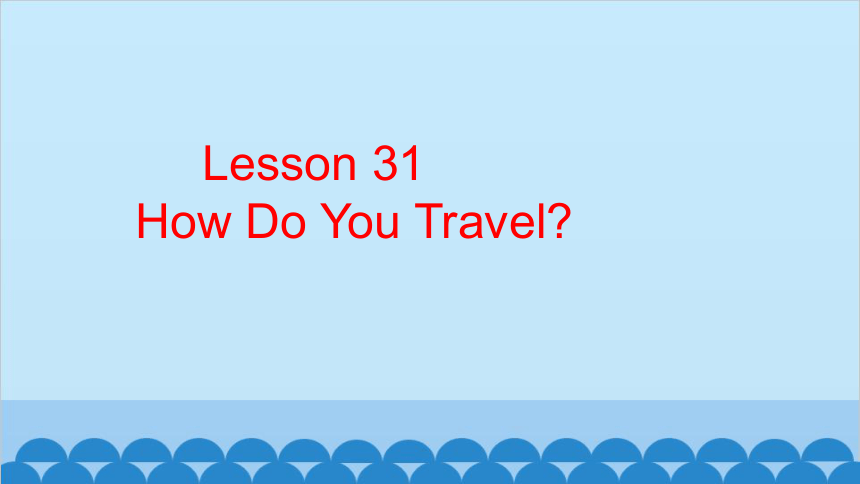 | |
| 格式 | ppt | ||
| 文件大小 | 765.0KB | ||
| 资源类型 | 教案 | ||
| 版本资源 | 冀教版 | ||
| 科目 | 英语 | ||
| 更新时间 | 2023-07-21 16:49:49 | ||
图片预览

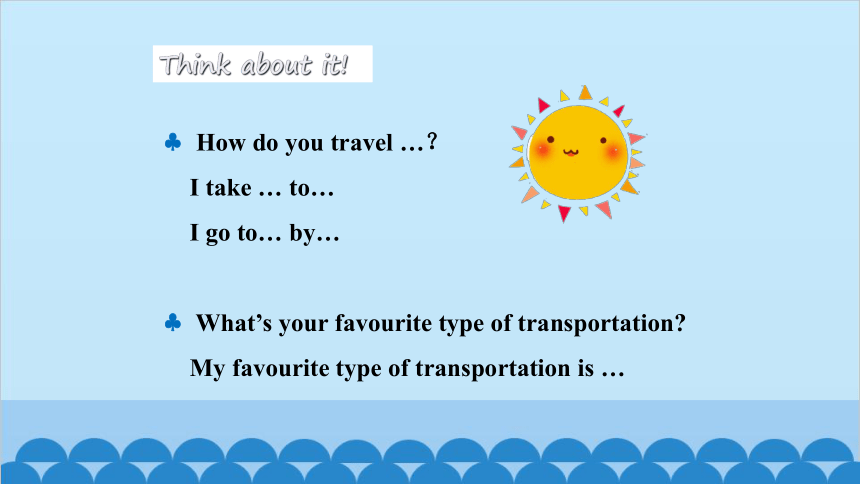
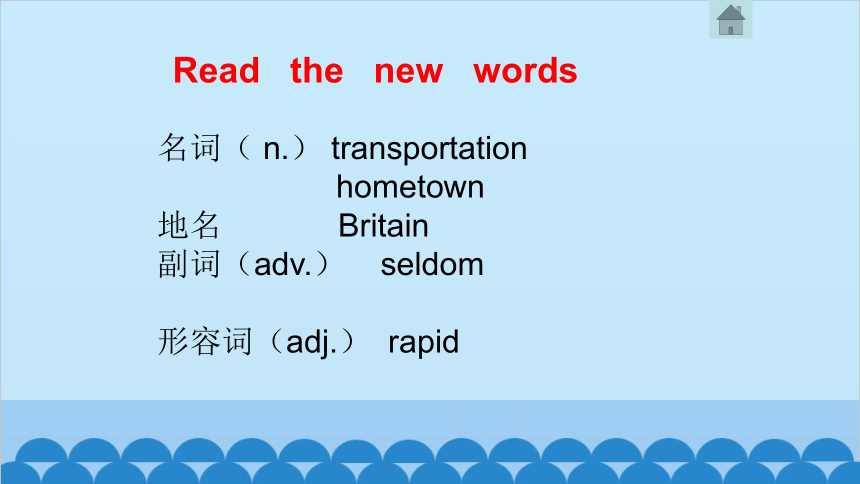
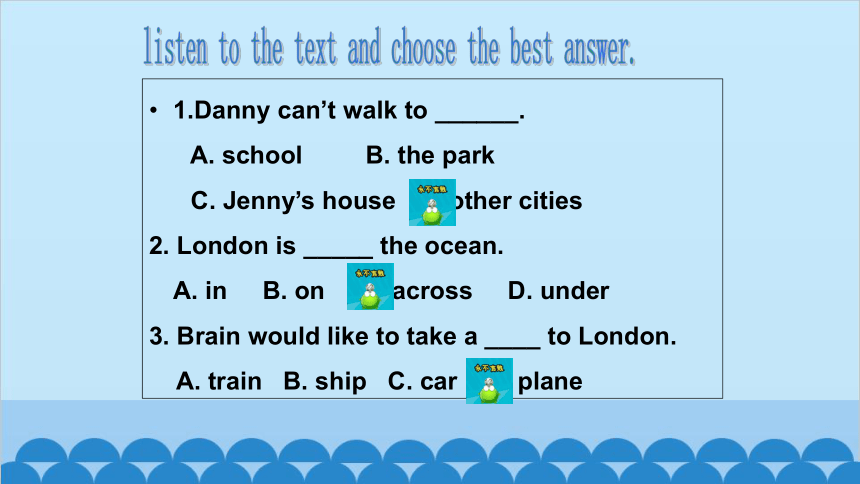

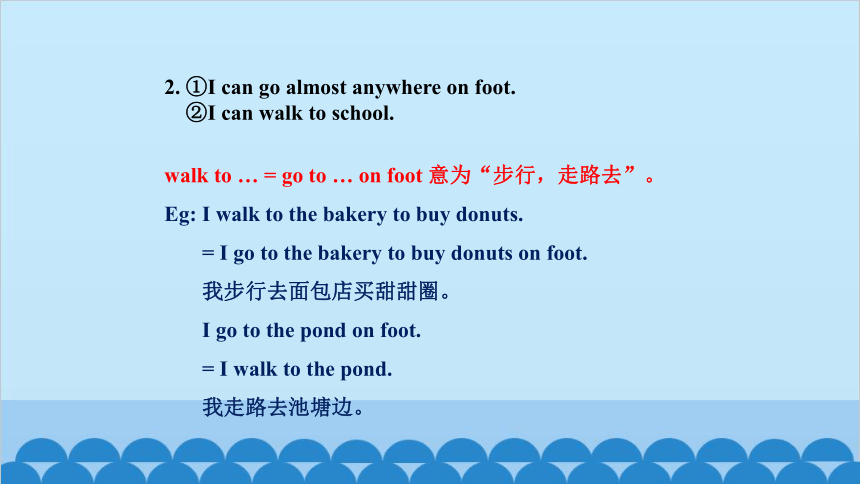
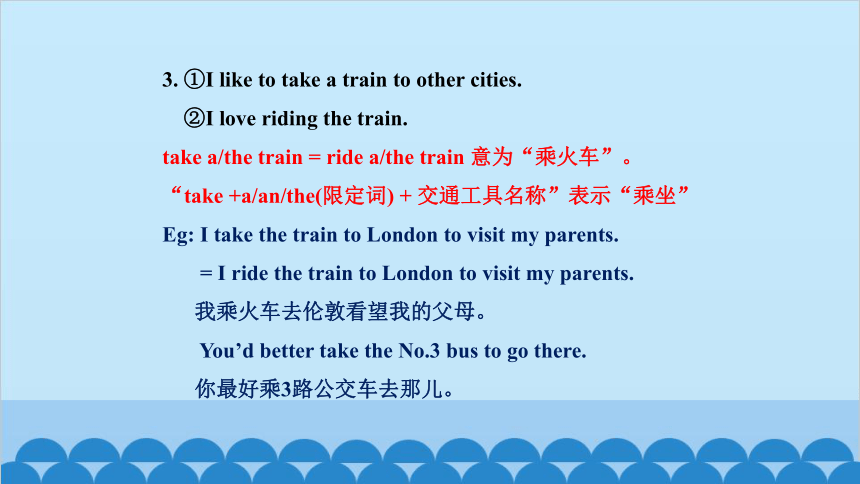
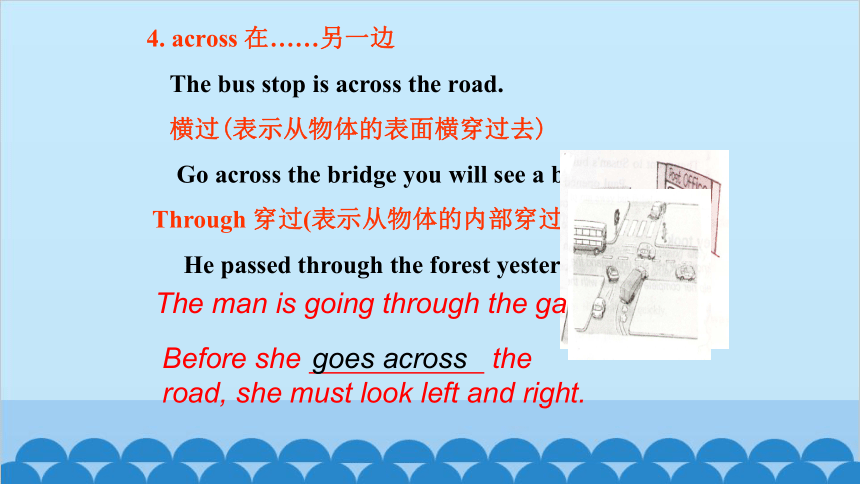
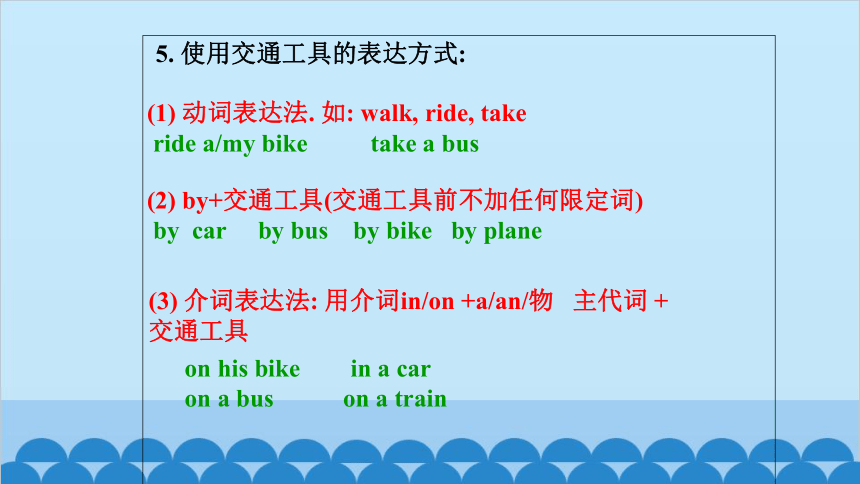
文档简介
(共24张PPT)
Lesson 31 How Do You Travel
Think about it!
How do you travel …?
I take … to…
I go to… by…
What’s your favourite type of transportation
My favourite type of transportation is …
Read the new words
名词( n.) transportation
hometown
地名 Britain
副词(adv.) seldom
形容词(adj.) rapid
1.Danny can’t walk to ______.
A. school B. the park
C. Jenny’s house D. other cities
2. London is _____ the ocean. A. in B. on C. across D. under
3. Brain would like to take a ____ to London.
A. train B. ship C. car D. plane
1.How do you like to travel
how do you like…询问“你认为……怎么样”或者
“你想怎么样……”
Eg: How do you like this movie
你认为这部电影怎么样
How do you like to go to school
你想怎样去学校?
Language points
2. ①I can go almost anywhere on foot.
②I can walk to school.
walk to … = go to … on foot 意为“步行,走路去”。
Eg: I walk to the bakery to buy donuts.
= I go to the bakery to buy donuts on foot.
我步行去面包店买甜甜圈。
I go to the pond on foot.
= I walk to the pond.
我走路去池塘边。
3. ①I like to take a train to other cities.
②I love riding the train.
take a/the train = ride a/the train 意为“乘火车”。
“take +a/an/the(限定词) + 交通工具名称”表示“乘坐”
Eg: I take the train to London to visit my parents.
= I ride the train to London to visit my parents.
我乘火车去伦敦看望我的父母。
You’d better take the No.3 bus to go there.
你最好乘3路公交车去那儿。
4. across 在……另一边
The bus stop is across the road.
横过(表示从物体的表面横穿过去)
Go across the bridge you will see a bakery.
Through 穿过(表示从物体的内部穿过去)。
He passed through the forest yesterday.
The man is going through the gate.
Before she the road, she must look left and right.
goes across
5. 使用交通工具的表达方式:
(2) by+交通工具(交通工具前不加任何限定词)
by car by bus by bike by plane
on his bike in a car
on a bus on a train
(3) 介词表达法: 用介词in/on +a/an/物 主代词 +交通工具
(1) 动词表达法. 如: walk, ride, take
ride a/my bike take a bus
6. I seldom travel by ship.
seldom 为表示频率的副词,意思是“很少;不常”。
seldom通常放在一般动词之前,be动词,情态动词及
助动词等之后。
Eg: She seldom goes out at night.
她晚上很少出门。
(2) seldom 虽表示不完全否定,但由于其含有否定意义,
故含有seldom的句子相当于否定句;在反义疑问句中,疑
问部分要用肯定式。
Eg: You seldom call your parents, do you
你很少给父母打电话,对吗?
7.Could 用于委婉客气地提出问题或陈述看法,回答时用can或may。
肯定回答时常用 Certainly ./ Sure ./ Of course.
否定回答时用Sorry. / Oh,please don’t.
Could you pass me a glass of milk,please
---Sure./Certainly.
Could I borrow your bike
---Yes,you can.
8.rapid 是形容词,快的,迅速的,动作快的。在句中作定语; fast 作副词,指动作本身的迅速。quickly 表示即刻行动,毫不迟延,指动作在较短时间或较近的将来即可发生或完成。
Tom is a ______ worker.
He speaks very ______.
Come here _________. The meeting will begin in a minute.
rapid
fast
quickly
He can go to school on foot.
He can walk to school.
She can go to work by bike.
She can go to work on a bike.
She can ride a bike to work.
She would go to work by bus.
She would take a bus to work.
She would go to work on a bus.
They could go to Beijing by train .
They could take a train to Beijing.
They could go to Beijing on a train.
She could go there by ship.
She could take a ship to go there.
She could go there on a ship.
Beijing
walk
ride a bike
take a car
take a plane
slow
fast
faster
the fastest
a rapid type
the most
rapid type
a more
rapid type
Read the dialogue in a group of three and try your best to act it out.
1. I often walk to school.
= I often go to school_____ ______.
2. He can go to work by car everyday.
= He __________ a car to work everyday.
on foot
Can take
3. Lin Ming can ______(jump) very high, but Meimei _____(can)
jump
can’t
4.-Could I watch TV now -Sorry, you .
A. can’t B. couldn’t C. needn’t
5. -Would you like some tea -No, .
A.I wouldn’t B. I can’t C. thanks
6. They went the door their bikes.
A. through, on B. across, by
C. along, in
Write a composition about traffic.
( It may include traffic rules, accidents, pollution and other problems. What should we do to protect our lives )
Lesson 31 How Do You Travel
Think about it!
How do you travel …?
I take … to…
I go to… by…
What’s your favourite type of transportation
My favourite type of transportation is …
Read the new words
名词( n.) transportation
hometown
地名 Britain
副词(adv.) seldom
形容词(adj.) rapid
1.Danny can’t walk to ______.
A. school B. the park
C. Jenny’s house D. other cities
2. London is _____ the ocean. A. in B. on C. across D. under
3. Brain would like to take a ____ to London.
A. train B. ship C. car D. plane
1.How do you like to travel
how do you like…询问“你认为……怎么样”或者
“你想怎么样……”
Eg: How do you like this movie
你认为这部电影怎么样
How do you like to go to school
你想怎样去学校?
Language points
2. ①I can go almost anywhere on foot.
②I can walk to school.
walk to … = go to … on foot 意为“步行,走路去”。
Eg: I walk to the bakery to buy donuts.
= I go to the bakery to buy donuts on foot.
我步行去面包店买甜甜圈。
I go to the pond on foot.
= I walk to the pond.
我走路去池塘边。
3. ①I like to take a train to other cities.
②I love riding the train.
take a/the train = ride a/the train 意为“乘火车”。
“take +a/an/the(限定词) + 交通工具名称”表示“乘坐”
Eg: I take the train to London to visit my parents.
= I ride the train to London to visit my parents.
我乘火车去伦敦看望我的父母。
You’d better take the No.3 bus to go there.
你最好乘3路公交车去那儿。
4. across 在……另一边
The bus stop is across the road.
横过(表示从物体的表面横穿过去)
Go across the bridge you will see a bakery.
Through 穿过(表示从物体的内部穿过去)。
He passed through the forest yesterday.
The man is going through the gate.
Before she the road, she must look left and right.
goes across
5. 使用交通工具的表达方式:
(2) by+交通工具(交通工具前不加任何限定词)
by car by bus by bike by plane
on his bike in a car
on a bus on a train
(3) 介词表达法: 用介词in/on +a/an/物 主代词 +交通工具
(1) 动词表达法. 如: walk, ride, take
ride a/my bike take a bus
6. I seldom travel by ship.
seldom 为表示频率的副词,意思是“很少;不常”。
seldom通常放在一般动词之前,be动词,情态动词及
助动词等之后。
Eg: She seldom goes out at night.
她晚上很少出门。
(2) seldom 虽表示不完全否定,但由于其含有否定意义,
故含有seldom的句子相当于否定句;在反义疑问句中,疑
问部分要用肯定式。
Eg: You seldom call your parents, do you
你很少给父母打电话,对吗?
7.Could 用于委婉客气地提出问题或陈述看法,回答时用can或may。
肯定回答时常用 Certainly ./ Sure ./ Of course.
否定回答时用Sorry. / Oh,please don’t.
Could you pass me a glass of milk,please
---Sure./Certainly.
Could I borrow your bike
---Yes,you can.
8.rapid 是形容词,快的,迅速的,动作快的。在句中作定语; fast 作副词,指动作本身的迅速。quickly 表示即刻行动,毫不迟延,指动作在较短时间或较近的将来即可发生或完成。
Tom is a ______ worker.
He speaks very ______.
Come here _________. The meeting will begin in a minute.
rapid
fast
quickly
He can go to school on foot.
He can walk to school.
She can go to work by bike.
She can go to work on a bike.
She can ride a bike to work.
She would go to work by bus.
She would take a bus to work.
She would go to work on a bus.
They could go to Beijing by train .
They could take a train to Beijing.
They could go to Beijing on a train.
She could go there by ship.
She could take a ship to go there.
She could go there on a ship.
Beijing
walk
ride a bike
take a car
take a plane
slow
fast
faster
the fastest
a rapid type
the most
rapid type
a more
rapid type
Read the dialogue in a group of three and try your best to act it out.
1. I often walk to school.
= I often go to school_____ ______.
2. He can go to work by car everyday.
= He __________ a car to work everyday.
on foot
Can take
3. Lin Ming can ______(jump) very high, but Meimei _____(can)
jump
can’t
4.-Could I watch TV now -Sorry, you .
A. can’t B. couldn’t C. needn’t
5. -Would you like some tea -No, .
A.I wouldn’t B. I can’t C. thanks
6. They went the door their bikes.
A. through, on B. across, by
C. along, in
Write a composition about traffic.
( It may include traffic rules, accidents, pollution and other problems. What should we do to protect our lives )
同课章节目录
- Unit 1 Me and My Class
- Lesson 1 Back to School!
- Lesson 2 Many Faces, One Picture
- Lesson 3 Getting to Know You!
- Lesson 4 Best Friends
- Lesson 5 Meet Ms. Liu
- Lesson 6 Jenny's Week
- Unit 2 My Favourite School Subject
- Lesson 7 Don't Be Late for Class!
- Lesson 8 E-mail Helpers!
- Lesson 9 I Don't Want to Miss Geography !
- Lesson 10 Looking for Lisa
- Lesson 11 Lily Learns about China !
- Lesson 12 Karen's Hair Stood Up!
- Unit Review
- Unit 3 Families Celebrate Togethe
- Lesson 13 I Love Autumn
- Lesson 14 Happy Memories
- Lesson 15 A Present for Li Ming!
- Lesson 16 Happy Thanksgiving!
- Lesson 17 Presents from Canada!
- Lesson 18 Li Ming's Birthday
- Unit Review
- Unit 4 My Neighbourhood
- Lesson 19 The Best Neighourhood
- Lesson 20 No Stopping!
- Lesson 21 Eat a Donut and Turn Right
- Lesson 22 I Like My Neighbourhood
- Lesson 23 People in My Neighbourhood
- Lesson 24 I Need a Map!
- Unit Review
- Unit 5 My Future
- Lesson 25 I Want to Be a Teacher!
- Lesson 26 What Will I Be ?
- Lesson 27 What's Your Advice?
- Lesson 28 Rich or Poor? It Doesn't Matter!
- Lesson 29 Our Ambitions and Dreams
- Lesson 30 A Famous Friend?
- Unit Review
- Unit 6 Go With Transportation !
- Lesson 31 How Do You Travel ?
- Lesson 32 Trains Go Faster !
- Lesson 33 Life on Wheels
- Lesson 34 Flying Donuts
- Lesson 35 Future Transportation
- Lesson 36 Clean Cars ?
- Unit Review
- Unit 7 Enjoy Your Hobby
- Lesson 37 What's Your Hobby ?
- Lesson 38 Hobbies Are Fun!
- Lesson 39 Danny's Hobby
- Lesson 40 What's Paul's Hobby?
- Lesson 41 Show and Tell!
- Lesson 42 The New Club
- Unit Review
- Unit 8 Celebrating Me
- Lesson 43 What Makes You Unique?
- Lesson 44 Georgia Plays Basketball
- Lesson 45 Be Yourself !
- Lesson 46 My Dream
- Lesson 47 I Made It !
- Lesson 48 Li Ming's Report
- Unit Review
